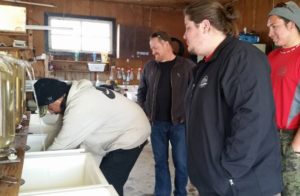Nipissing First Nation calls on all members to protect fish for generations to come

Photo courtesy of Nipissing First Nation.
By Kelly Anne Smith
NIPISSING FIRST NATION—Nipissing First Nation (NFN) Chief Scott McLeod is dealing with rebel fishermen and angry non-First Nation fishermen with a call to shut down the upcoming ice fishing season.
“Who is protecting the fish?” Chief Scott McLeod asked in response to watching a six-minute online video posted by Rodney Commanda on September 10, 2016.
In the video’s comments section, Commanda said a confrontation took place on Lake Nipissing near Garden Village at around 7:30am on September 10, 2016. “MNR with NFN Natural Resource representative attempting to interfere with NFN members treaty protected right to fish”, he wrote.
The video shows a boat approached by a Ministry of Natural Resources boat. In the video, a man’s voice is heard saying, “If you are going to charge us, do it now or leave us alone. That’s what the lawyer said.”
After seeing the video, NFN member Bob Goulais asked his fellow Nbisiing Anishinaabeg to speak up. He wrote on his blog the day after the video was posted. “It’s time to stand up and protect the lake, the fish, and our right to a future fishery. I’m asking you to stand up and speak out against those who threaten our fishery. That’s not the MNR, our fisheries officials or our Chief and Council. The real threat is from those who are fishing illegally, pretending to be the righteous, who disregard what is right.”
Chief Scott McLeod says that some band members are well-intentioned, but misguided. “They say that they are fighting for Treaty Rights. But I don’t think they fully understand the responsibilities that come along with the Treaty Rights.
Back in the 70’s and 80’s, we fought for our access to fisheries. We won that fight,” added Chief McLeod. He continued on to say that this is not the same fight and that they are fighting over proper management.
“We are trying to make sure the fish are there to exercise our rights on. If we don’t protect the fish, there won’t be rights to access those fish. Our guys on the [MNR] boat…are just doing their job. They are trying to make sure that the laws we created here at NFN are enforced.”
Chief McLeod points to the Sparrow case. “Part of that Supreme Court case was that the stocks must remain paramount before any rights are exercised. That includes Treaty Aboriginals right to access. If you don’t give the fish the right to exist, then the Treaty rights are a moot point.”
Chief McLeod reasons that Anishinaabe people are stewards of the land and waters. “That means actually taking on the responsibility of protecting resources for future generations. Continuing to fish with no regard to sustainability is not protecting rights for generations to come.”
Chief McLeod says there are processes in place for those who choose to deal with our community’s justice circles. “If they don’t want to follow our rules, it will be handed over to the ministry and they can follow mainstream rules. We have to follow rules. That is the responsibility part of managing the resources.”
Chief McLeod is concerned with the infringement of rights of others, not just those of the NFN band members. “This interferes with their neighbours Aboriginal rights. What we are doing is preserving the collective rights.”
There has been a flurry of comments on various social media platforms with the Chief’s request to have the winter fishery closed. “We’re in this situation of two nations because of the signing of the Treaties.
The [non-First Nation] population in our area have to understand that when we signed these Treaties, they didn’t give us the privilege to hunt and fish in our own territory. We gave them the privilege by signing the Treaties.
When we signed these Treaties, we didn’t relinquish all those responsibilities or any type of ownership over the resource. We never gave up our sovereignty as a nation.
They don’t have the rights to that fishery. We are upholding the Treaty by sharing the resources, not handing it over to them and not begging for a piece of it. The average Canadian doesn’t even know the country was founded on Treaty relationships.”


